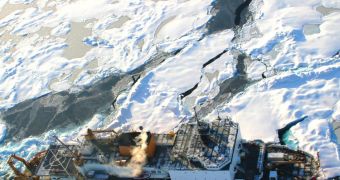Scientists with the United States Geological Survey (USGS) and the University of South Florida (USF) will embark on a new expedition tomorrow, August 25. During the four-week journey, the team will investigate the state of oceanic acidification near the North Pole.
The goal of the expedition, which is the third iteration of a larger research project, is to quantify the effects that water acidification has on the future of marine and terrestrial ecosystems in the area, and on the species living in those habitats.
Acidification occurs when pH levels in the water drop. This can happen on account of direct pollution, but also when the waters are trying to soak up too much atmospheric carbon dioxide (CO2) and other greenhouse gases.
The Arctic Ocean is widely believed to be one of the areas most susceptible to experiencing the negative effects of global warming and climate change. Still, very few studies have thus far been conducted there.
The new investigation will be carried out from aboard the US Coast Guard icebreaker Healy. The vessel will travel through the Arctic waters for about a month, stopping along the way so that researchers can collect water and ice samples from different locations.
One of the main reasons why understanding the effects of acidification is so important is that numerous species, humans included, rely on the ocean to provide them with sustenance. If marine species decline, then food security for all these animals, including us, may be jeopardized.
Marine animals and organisms that build shells or skeletons, including crabs, shrimp, plankton, oysters and corals, are the worst affected by acidification, since the phenomenon decreases the rates at which calcification occurs.
“Ocean acidification is a particularly vexing problem associated with the release of CO2 into the atmosphere from the burning of fossil fuels because it interferes with the ability of marine organisms to build hard shells of calcium carbonate,” USGS Director, Marcia McNutt, explains.
“Comparatively more research has been devoted to the tropics, where coral reefs are threatened,” the official goes on to say, again highlighting the importance of the new mission. The crew and scientist will embark tomorrow, August 25.
“This important expedition focuses on polar latitudes, where the acidification effects can cascade from microscopic organisms up to our economy, as the organisms at risk form the base of the food chain for some of the world's most productive fisheries,” McNutt concludes.

 14 DAY TRIAL //
14 DAY TRIAL //